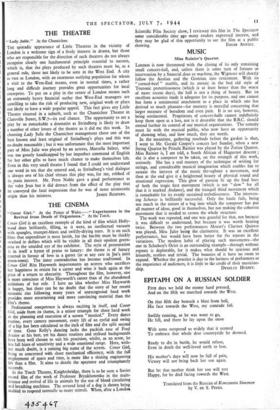MUSIC
Miss Rainier's Quartet
LONDON is now threatened with the closing of its only remaining small concert-hall, and, unless there is some turn of fortune or
intervention by a financial deus ex machine, the Wigmore will shortly follow the Aeolian and the Grotrian into retirement. With its " corned-beef " marble, and its mosaic in the bad old style of Teutonic pretentiousness (which is at least better than the worst of more recent days), the hall is not a thing of beauty. But its excellent acoustics made it adequate for its purpose, and one cannot but form a sentimental attachment to a place in which one has derived so much pleasure—for memory is merciful concerning that larger measure of boredom and even pain. It is no use, however, being sentimental. Proprietors of concert-halls cannot indefinitely keep them open at a loss, nor is it desirable that the B.B.C. should extend further its control of our musical organisations. The remedy must lie with the musical public, who now have an opportunity of showing what, and how much, they are worth.
In the meantime, gathering rosebuds before the garden is shut, I went to Mr. Gerald Cooper's concert last Sunday, when a new String Quartet by Priaulx Rainier was played by the Zorian Quartet. Miss Rainier is, I am told, a South African of Huguenot descent ; she is also a composer to be taken, on the strength of this work, seriously. She has a real mastery of the technique of writing for strings, and considerable musical imagination which enables her to sustain the interest of the music throughout a movement, and then at the end give it a heightened beauty of physical sound and emotional expression. This glow of passion lit up the final bars of both the tragic first movement (which is not " slow " for all that it is marked Andante), and the tranquil third movement which is remarkable for its evenly sustained melodiousness. The interven- ing Scherzo is brilliantly successful. Only the finale fails, being too much in the nature of a bag into which the composer has put all manner of ideas, good in themselves, but not making the coherent movement that is needed to crown the whole structure.
The work was repeated, and one was grateful for that, not because it was difficult to understand, but because it was worth hearing twice. Between the two performances Mozart's Clarinet Quintet was played, Miss Juler being the clarinettist. It was an excellent performance, but would have been better for the repeats in the variations. The modern habit of playing such movements—the one in Schubert's Octet is an outstanding example—through without repeats is deplorable, for it makes what should be spacious and leisurely, restless and trivial. The beauties of it have no room to expand. Whether the .practice is due to the laziness of performers or the impatience of audiences, it is little to the credit of their musician-


























 Previous page
Previous page